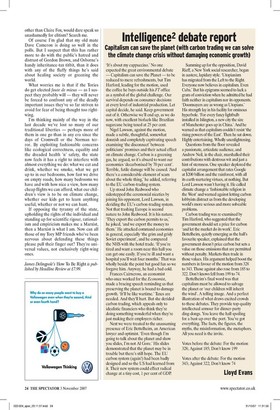Intelligence2 debate report
Capitalism can save the planet (with carbon trading we can solve the climate change crisis without damaging economic growth) 'It's about my cappuccino.' No one expected the great environmental debate — Capitalism can save the Planet — to be reduced to mere refreshments, but Tim Harford, leading for the motion, used the coffee he buys outside his FT office as a symbol of the global challenge. Our survival depends on consumer decisions at every level of industrial production. Let capital decide, he said. Keep government out of it. Otherwise we'll end up, as we do now, with excellent biofuels like Brazilian sugarcane being taxed at 25 per cent.
Nigel Lawson, against the motion, made a subtle, thoughtful, somewhat donnish and completely captivating speech examining `the disconnect' between politicians' promises and their actual effect on climate change. Carbon is a greening gas, he argued, so it's absurd to want our economies 'decarbonised by 70 per cent'. Terrible, futile damage will be caused. And there's a considerable element of scam about the whole thing,' he added, referring to the EU carbon-trading system.
Up stood John Redwood who sidestepped the ceremonial niceties by joining his opponent, Lord Lawson, in deriding the EU's carbon-trading system. Not that trashing Europe is second nature to John Redwood. It is his nature. 'They export the carbon permits to us,' he joked, 'and we export the money to them.' He attacked command economies in general, especially `the grim and grisly Soviet experiment', and he compared the NHS with the hotel trade. 'If you're tired and want a room near this hall you can get one easily. If you're ill and want a hospital you'll wait four months.' That was wholly beside the point but good fun so we forgave him Anyway, he had a bad cold.
Frances Cairncross, an economist who once worked for the Economist, made a bracing speech reminding us that preserving the planet is bound to damage growth. 'It'll be like wartime.' Taxes are needed. And they'll hurt. But she derided carbon trading, which appeals only to idealistic financiers who think they're doing something wonderful when they're just making their employers richer.
Next we were treated to the unassuming presence of Eric Bettelheim, an American lawyer and optimist. 'Even though I'm going to talk about the planet and show you slides, I'm not Al Gore.' His slides demonstrated that the planet may be in trouble but there's still hope. The EU carbon system (again!) had been badly designed and so the US had learned from it. Their new system could effect radical change at a tiny cost, 1 per cent of GDP.
Summing up for the opposition, David Rieff, a New York social researcher, began in austere, lapidary style. 'Utopianism has migrated from the Left to the Right. Everyone now believes in capitalism. Even Cuba.' But his epigrams seemed to lack a gram of conviction when he admitted he had faith neither in capitalism nor its opponents. Doomsayers are as wrong as Utopians.' His strength lay in his facility for ominous hyperbole. 'For every fancy lightbulb installed in Islington, a new city the size of Manchester goes up in China.' And he warned us that capitalism couldn't resist `the rising powers of the East'. Then he sat down. Highly entertaining. Wholly unenlightening.
Questions from the floor revealed a passionate, articulate audience, and Andrew Neil, in the chair, marshalled their contributions with dextrous wit and just a hint of sternness. One speaker deplored the capitalist arrangement that rates Google at $200 billion and the rainforest, with all its earth-nurturing virtues, at nothing. But Lord Lawson wasn't having it. He called climate change a `fashionable religion in the West' and warned against letting carbon lobbyists distract us from the developing world's more serious and more solveable problems.
Carbon trading was re-examined by Tim Harford, who suggested that the government should set a price for carbon 'and let the market do its work'. Eric Bettelheim, quietly emerging as the hall's favourite speaker, explained that the government doesn't price carbon but sets a value on those emissions that are permitted without penalty. Markets then trade in those values. His argument helped boost the numbers in favour of the motion from 328 to 343. Those against also rose from 185 to 322. Don't knows fell from 199 to 74.
Bettelheim's final word was that capitalism must be allowed to salvage the planet or 'our children will inherit the wind'. A telling image. And a perfect illustration of what draws excited crowds to these debates. They provide top-quality intellectual armour for dinner-party ding-dongs. You leave the hall spoiling for a bust-up over the port. You've got everything. The facts, the figures, the myths, the misinformation, the metaphors. All you need is the invite.
Votes before the debate: For the motion 328; Against 185; Don't know 199 Votes after the debate: For the motion 343; Against 322; Don't know 74 Lloyd Evans












































































 Previous page
Previous page